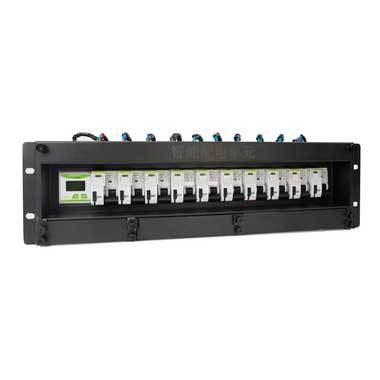What Is the Difference Between PDU and IPDU?
2023/05/18 丨Technical
Power management plays a critical role in data centers and network environments because it serves the function of ensuring proper distribution and monitoring of power. To ensure proper operation, power distribution units (PDUs) and intelligent power distribution units (IPDUs) play a major role. Although they provide the same basic functions, there are some key differences between PDUs and IPDUs.
Power Distribution Unit (PDU)
A power distribution unit (PDU) is a device that distributes power to multiple power outlets. PDUs are typically used in data centers and can also be used to distribute power to servers, switches, and other IT equipment. They are available in a variety of form factors, including rack mount, vertical, and horizontal.
Key Features of PDUs
Basic Power Distribution: The PDU is designed to provide basic power distribution for multiple devices as its core. It is designed to promote the management of power connections to devices through multiple outlets.
Form Factor: The PDU is designed to fit a variety of rack sizes, including 1U, 2U, and 0U (vertical). It is also easier to integrate into existing IT infrastructures.
Limited Monitoring and Management: The base PDUs do not have online monitoring or remote control management capabilities. They are primarily designed for power distribution without additional intelligent functions.
Intelligent Power Distribution Unit (IPDU)
Intelligent power distribution units (IPDUs) are PDUs that provide additional power distribution monitoring and control functions. IPDUs are equipped with built-in intelligent features that are particularly useful for optimizing power consumption, extending uptime, and improving overall operational efficiency. In addition, IPDUs can be used to improve the efficiency and reliability of data center power management.
Key Benefits of IPDUs
Power Monitoring: The IPDU provides real-time power monitoring. By tracking power consumption at the outlet level, the IPDU provides administrators with a detailed view of each device's power usage. This data collection can be used to optimize energy efficiency, analyze potential problems, and plan for future capacity needs.
Remote Control and Management: The IPDU can remotely manage and control the power consumption of individual outlets. This allows you to turn outlets on and off, cycle power, and even set power-on sequences. This is extremely beneficial in large data centers or other multi-site environments, as it allows administrators to manage power usage across multiple sites from a single console.
Environmental Monitoring: The IPDU also provides advanced environmental monitoring capabilities. Monitoring can be based on user-defined thresholds for power consumption, temperature, or humidity and can provide alerts when conditions exceed predefined thresholds. By monitoring environmental conditions, IPDUs can help prevent equipment failures and other problems caused by adverse conditions.
Integration with Network Management Systems: IPDUs can integrate with network management systems such as SNMP to centrally monitor and manage your entire IT infrastructure.
Conclusion
While both PDUs and IPDUs power equipment in the data center, IPDUs offer additional features such as remote management, environmental monitoring, and power usage reporting. Choosing the right type of device for your data center or IT environment depends on your specific needs and budget, but IPDUs are often a better choice for larger, more complex environments that require advanced monitoring capabilities.
- Solutions
- Products & Support
- Cases
- About us
- Contact
TEL:+86 18621879631
Email:timmy@matismart.com
Mobile phone:+86 15801814653
Address:Room 320, No.83, Huanhu West Road 3, Pudong, Shanghai, China, 201306
Wechat:+86-15801814653
Skype:timmybao2008
 沪ICP备09024882号-1
沪ICP备09024882号-1




 CN
CN





 Home
Home

